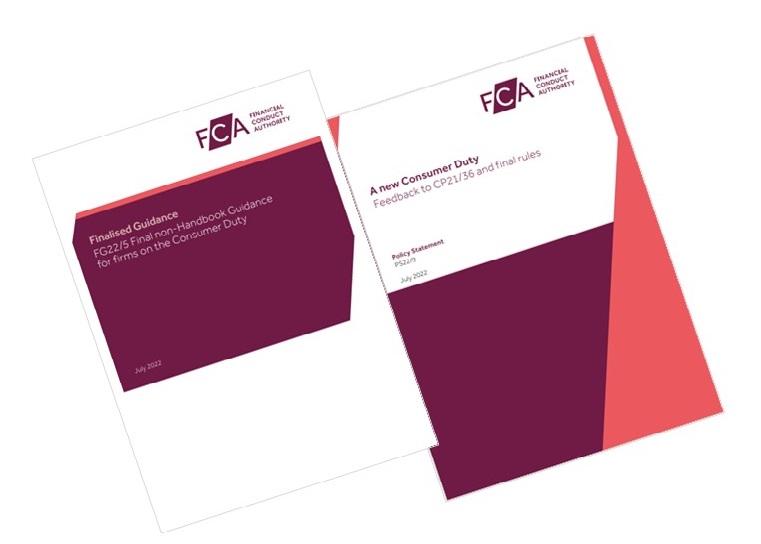The Consumer Duty From The Financial Conduct Authority – Will It Make Any Difference In Ensuring That Customers Are Treated Fairly?
- 15 February 2023

The Financial Conduct Authority (FCA) published its new Consumer Duty in July 2022 and since then there’s been a steady stream of content generated on the subject, including from the FCA (see below), but the real question is: will it make any difference to end customers of firms regulated by the FCA when the requirements kick in from July 2023?
The FCA (formerly Financial Services Authority – FSA) first published guidance on Treating Customers Fairly (TCF) almost 20 years ago and continued to update that guidance on a regular basis. The requirements and recommendations were updated before the FCA went out to consultation on a new Consumer Duty. The finalised guidance on the Consumer Duty was published in July ’22. With this new Duty, the FCA has stated that “[the] new duty sets higher and clearer standards of consumer protection across financial services and requires firms to put their customers’ needs first”, which strongly implies that they’re not overly satisfied by the efforts of the financial services sector so far in Treating Customers Fairly.
There’s been a lot of talk in vulnerable customer communities about the arrival and expected impact of The Consumer Duty, and for good reason, with customers in vulnerable circumstances having suffered harm and detriment during the Treating Customers Fairly years. The new Duty does, of course, apply to all customers and not just those in vulnerable circumstances, with firms required to evidence that vulnerable customers have been treated as fairly as those in non-vulnerable circumstances.
So let’s have a look at the Consumer Duty to see how it’s different from TCF and how it may make a difference for all retail customers. The Duty applies to all firms regulated by the FCA from Banking, Insurance, Pensions through to Foreign Exchange, and all firms irrespective of size whether ‘manufacturing’ or ‘distributing’ the products and services within the regulated markets.
The central idea of The Consumer Duty is that customers’ best interests are at the heart of decision making for firms. There’s an overriding Consumer Principle that firms are required to act to deliver good outcomes for retail customers. There are three cross-cutting rules that apply across all sectors;
firms will act in good faith towards retail customers, they will avoid causing foreseeable harm and they will enable and support these customers to pursue their financial objectives. The FCA has also identified that applying the customer principle and abiding by the cross-cutting rules will deliver fair treatment for all customers in products and services, price and value, consumer understanding and consumer support. They have asked firms to focus on delivering these four outcomes.
So how is this any different to the expectations of Treating Customers Fairly (TCF)? Shouldn’t we as retail customers have reasonably expected these standards to have been observed before? It appears that the understanding within firms varied considerably as to how to interpret TCF. Hence this clearer and stronger position being issued.
The FCA states that “all firms must be able to show consistently that fair treatment of customers is at the heart of their business model”. Again, that sounds as though this should be a reasonable expectation of a customer, where’s the difference? The key shift appears to be that the onus is switching from the FCA having to prove that a firm has not treated a customer fairly when they investigate. The onus now sits squarely with the firm having to be able to evidence that they have treated a customer fairly and that any customers in vulnerable circumstances have been treated as fairly as those who are not. In the finalised guidance the FCA has even provided questions that firms should expect to be asked should an investigation be triggered.
Since the launch of the requirements in July 2022, the FCA has stepped up its efforts to clarify the requirements and issue guidance and support for firms in their preparations to be ready for the July 2023 deadline for new and current products and services. This support has been coming in a variety of sources including a series of podcasts. In one of these sessions Richard Wilson, The FCA’s Manager of Consumer Policy, described the new duty as being a ‘paradigm shift’. Others have described it as being the “biggest shake-up to financial services regulation for a decade”.
It seems clear that the regulator is expecting a significant change in approach and culture from regulated firms and yet the FCA issued a stark warning just a few weeks ago saying there was a “risk that they may struggle to apply the Duty effectively once the rules come into force”. The FCA warned that some companies’ plans to implement the new duty were still “lacking in detail” and “contain limited information about how the duty will be embedded”.
Given the FCA’s outreach through their webinars, Dear CEO letters, Podcasts and other articles it appears that they intend to take a serious position with City AM reporting that “The Financial Conduct Authority is expected to take swift action against firms that fail to comply with new rules to protect savers and retail investors”. To date the fines for firms failing to treat customers fairly have been few and far between, we don’t expect that to remain the case. The message coming from the FCA appears to be ‘you have been warned!’
The requirements make it clear that to ensure compliance, firms will need to engage their whole business and not just customer-facing teams or advisors. There are specific requirements from the design of products and services, through testing them before going to market, monitoring them once live and in-market and post-sale as both market and customer situations are expected to change over time. Oh, and don’t forget that “the Duty applies to potential as well as actual customers of firms”. Therefore, the requirements will need to retain continuous focus, from across all areas of a firm and throughout the ‘customer journey’ from prospect to lapsed customer. To do this well, the Consumer Duty will need to be embedded into the culture of a firm and its leadership. We expect that firms are going to need a new suite of tools and additional training to ensure that they comply with all of the requirements across the whole business.
So, will all of these changes, communications and preparations make any difference to whether customers are actually treated fairly? In our view, yes. The FCA has set out its stall and prepared the ground. They have been vocal and clear in what’s expected from firms and when. They’ve already examined proposed implementation plans and in some sectors fed back that the plans are inadequate and suggest “complacency” which is a clear warning shot across the bows that paying lip-service will not be enough.
For the sake of customers including those in vulnerable circumstances, the proof will come from August 2023 onwards or when the FCA launches their first investigations and issues the first fines for non-compliance. We’re intrigued to see what happens.
To find out how we can assist you with your understanding of what’s required and how to achieve it, contact us.
Elaine Lee will be attending the Association of Foreign Exchange and Payment Companies (AFEP) Conference on February 22nd 2023 and will be presenting in partnership with Simon Tweddle and Karen Latham of Shapes First on the Products and Services outcome of Consumer Duty.
Elaine Lee, MD ReynoldsBusbyLee Ltd




